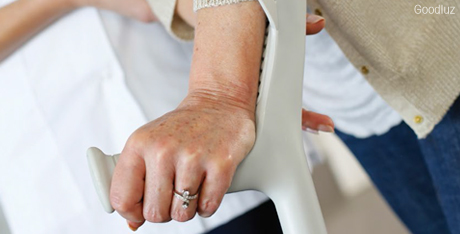For the past several months, Roberta, my PT, has been helping me strengthen core muscles I never knew existed. Recently, she taught me how to walk with crutches in preparation for the first of two hip arthroscopy surgeries for femoroacetabular impingement (FAI).
At first I fumbled along, unable to translate her verbal instructions into physical movements my legs would understand. I was always putting the wrong foot forward, especially when going up and down stairs, until she offered this refrain: “Up with the good. Down with the bad.”
Simple and wise advice, not only for which foot was to take the lead but also as a metaphor for the attitude to take toward surgery and its aftermath: up with healing, down with pain.
While Roberta helped me to prepare my body, I also knew I had to prepare my mind — and I don’t mean just readying my mind for surgery. I mean adopting a whole new approach to accepting help after surgery. I’ve always been better caring for others than I’ve been letting others care for me: Asking for or accepting help has never been my strength. As my surgery date neared, I was determined to change my ways, and I began by asking myself why I had such a hard time accepting help from others.
Here’s what I realized:
- I like to believe that I am self sufficient.
- I don’t want to impose on others.
- I don’t want to owe anyone anything.
When I looked at my list, I realized I was in big trouble. It was full of excuses. The same excuses that many have given me when I’ve reached out to help them. The same excuses that I’ve debunked for others time and again.
Now I had to debunk them for myself.
Here’s where I landed:
- When I’m honest with myself, I realize that I’m never fully in control, that rarely do I do something from start to finish without help. I don’t grow my own food, sew my own clothing, or get through life without friends, family or mentors.
- When I reach out to help others, I don’t feel imposed upon.
- I reach out to help them because I want to, because giving adds meaning to my life and makes me feel whole.
- When I offer to help someone, I never think, “This person owes me something.” On the contrary, I think, “I hope my doings are helpful.” My only desire is that the person I’ve helped is someday able to offer help to others when they need it, that he or she is able to pass the help forward.
After debunking my list of excuses, I realized it was time to take my own teachings to heart and to embark on an adventure of asking.
I sent an email to family and friends telling them of my upcoming surgeries; thanking them for any healing thoughts and/or prayers, calls, check-ins, visits or e-mails they would send my way; and letting them know how hard it was for me to ask for and accept help.
It’s now one week post-surgery, and here’s what I can report: My mom flew across the country to get me through my first week (though she would have been here anyway, asked or not). She was my personal caregiver, waitress, laundry folder, nurse, and my greatest emotional support. My husband continues to take care of me and keep the homestead going. He is shopping, driving, cooking, guiding me up and down stairs and in and out of the shower, filling my ice bucket, replenishing my ice packs, making me breakfast, and leaving me lunch.
Up with letting myself be loved and cared for. Down with trying to do it all alone.
My son picks up items I drop and helps me move my books and electronic devices from one room to the next. Friends are dropping off meals, flowers, fruits and gifts. They are emailing, calling, visiting, listening, and offering me rides to my doctor and PT appointments.
One friend, during her visit a few days after surgery when I was in a lot of pain, even called my surgeon’s office, explained my inability to tolerate certain medications and worked with the nurse to figure out an alternative. She also helped to alleviate my fear of becoming addicted to painkillers by telling me it was not my MO and by explaining to me that painkillers were crucial to my healing because they would give my system a rest from the extra cortisol it was producing.
As I move into my second week of healing, I’ve invested my PT’s refrain with an additional metaphor: Up with letting myself be loved and cared for. Down with trying to do it all alone.
My only question is this: Why did I wait more than half a century to learn the very lesson I’ve been spreading for years?



